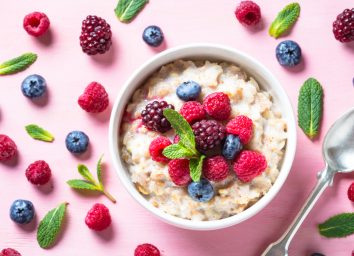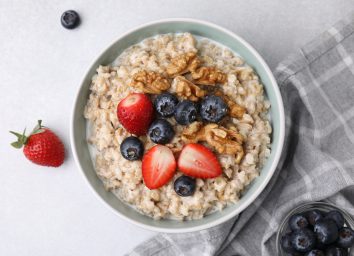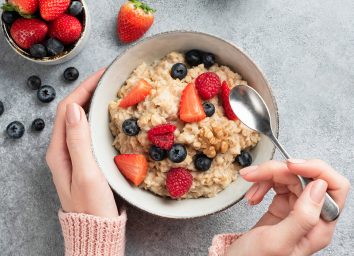5 Best Oatmeal Habits to Lower Cholesterol, Say Dietitians
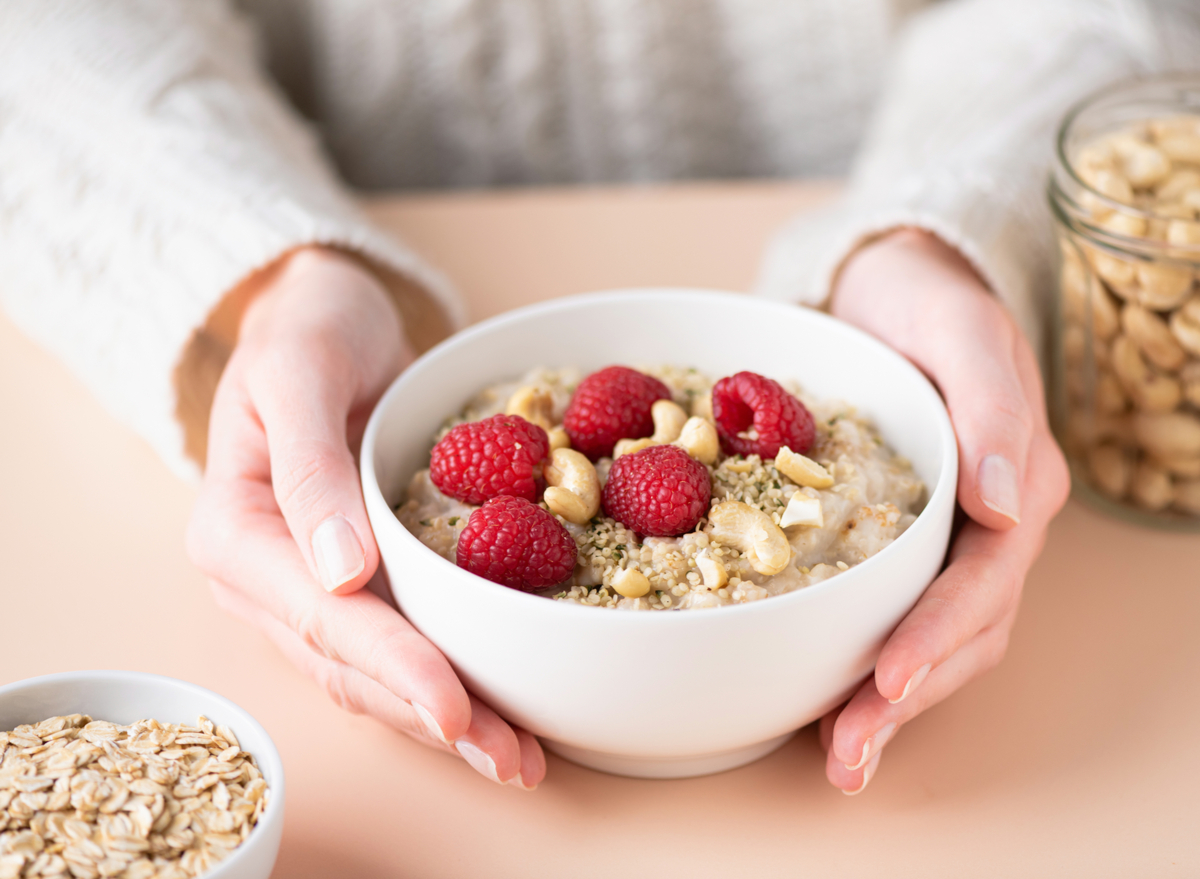
Oatmeal is such a powerhouse food, packed with essential nutrients like carbs and fiber, lending to a variety of different preparations. One of the health benefits of enjoying a daily bowl of oatmeal is the soluble fiber in this grain that can help lower blood cholesterol levels. This unique form of fiber is able to reduce the absorption of cholesterol in your bloodstream, and current data suggests just five to 10 grams or more of soluble fiber per day can help lower LDL cholesterol, which is considered to be the "bad" type that is more worrisome for your health. While the versatility of your oatmeal is endless, let's discuss the oatmeal habits you should be practicing to help lower cholesterol.
Top your oats with fruit.
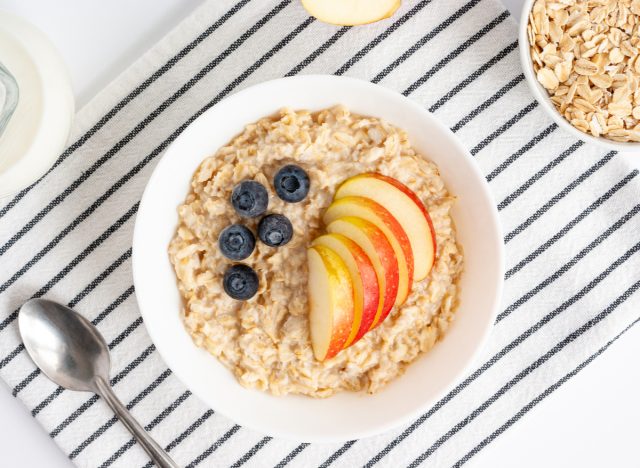
You may be familiar with some of the benefits of eating a few servings of fruit per day, like vitamin and antioxidant content, but did you know fruit also contains fiber? Most fruit provides insoluble fiber, the type that aids in digestive regularity, and some specific fruits also contain that cholesterol-lowering soluble fiber. Pears, berries, apricots, and apples are some of the fruits that contain soluble fiber, and all are easy to add to your bowl of oats!
Three-quarters of a cup of dry oats contains about three grams of soluble fiber, and adding a cup of one of these fruits to your bowl will up your soluble fiber intake by at least a gram. When trying to get at least 10 grams of soluble fiber per day, every gram counts.
Consider your liquid options.
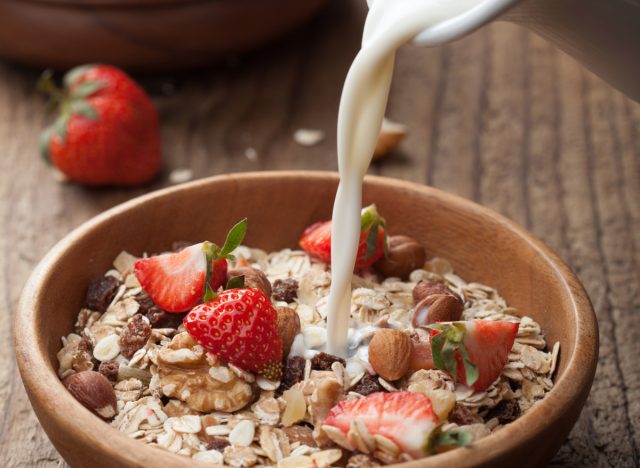
While some may choose to make their oatmeal with water, others enjoy the creaminess of oats made with milk. There are a few characteristics to keep in mind when choosing a milk that will aid in your cholesterol-lowering goals. If you prefer dairy milk, go with 1% or skim to limit the amount of cholesterol you consume. While a cup of whole milk contains about 24 milligrams of cholesterol, 1% milk provides half that, and skim only contains 5 milligrams per cup.
You may also consider plant-based milk alternatives, like soy, almond or oat that will contain zero milligrams of cholesterol. Choosing oat milk will provide an additional gram of soluble fiber per cup, which is a bonus; however, you will want to watch out for added sugar content in any milk option. Many milk alternatives contain added sugar which may actually increase blood LDL levels.
Skip the butter.
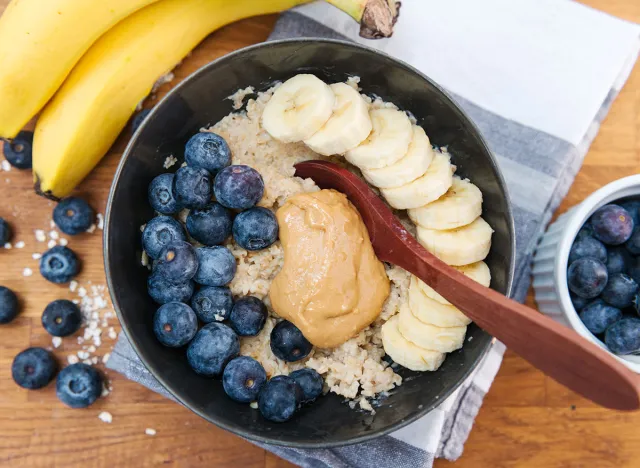
Melted butter atop a bowl of oatmeal. It sounds delicious and may be how many of us grew up eating oatmeal (with a spoonful… or two… of brown sugar), but this butter topper can work again your health goals. One tablespoon of butter contains about 30 milligrams of cholesterol.
While this may not seem like a lot, recommendations suggest consuming no more than 300 milligrams of cholesterol per day, and less may even be better for those with existing high cholesterol. So, a tablespoon of butter plus whole milk in your oatmeal may bring just your breakfast to over 50 milligrams of cholesterol.
Instead of adding butter to your oats, opt for a healthier form of fat. Nut butter, like almond or peanut, is a flavorful option that provides heart-healthy fats. If you like savory oatmeal, try topping your oats with a few slices of avocado.
Swap the sugar.
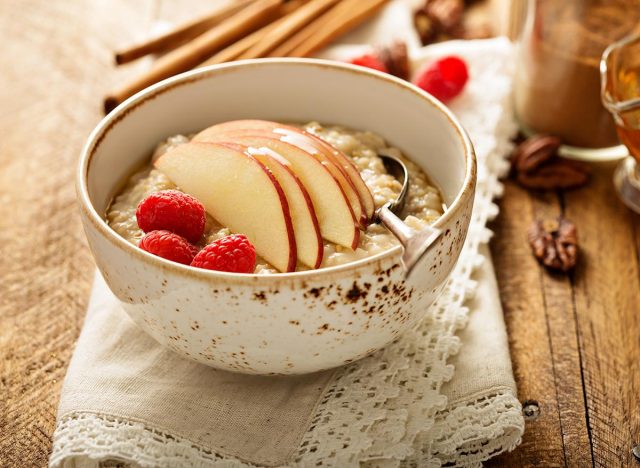
Remember that brown sugar I just mentioned? Well, it may be time to swap it out for a healthier alternative. Diets high in sugar can lead to your body producing more of the "bad" LDL cholesterol and lower levels of the "good" HDL cholesterol. While a couple of tablespoons of sugar may not seem like a big deal, the average American consumes 77 grams of sugar per day which is more than three times the recommended intake for women.
It is best to scale back on sugar intake whenever possible. Instead of topping your oats with sugar, try using your fruit topper as a sweet addition to your bowl. If that doesn't cut it, a couple of tablespoons of no-sugar-added applesauce may satisfy your sweet tooth without adding to cholesterol concerns.
If neither of those suggestions sound appealing, just scale back on the sugar you are currently using. Try cutting sugar use in half and allow some time for your taste buds to adapt before giving up on the lower-sugar oats. Sugar substitutes, like stevia and monk fruit may be good options, too.
Add some seeds.
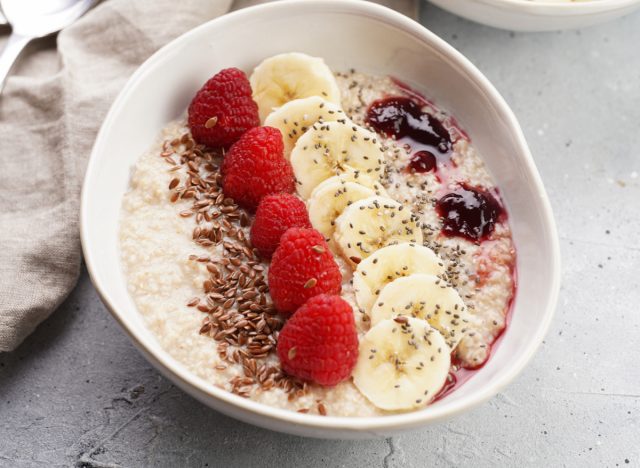
Flax, chia, and hemp seeds are great options for oatmeal toppers. All of these seed options are rich in fiber and they each contain soluble fiber, too. When combined with the soluble fiber in your oats and fruit, the addition of seeds can get you over five grams of soluble fiber in a single bowl of oatmeal.
Along with the fiber benefits, each of these seeds contains heart-healthy omega-3 fats that may be able to improve blood lipid levels. Additionally, these seeds provide a few grams of protein per serving, a nutrient that should be part of every breakfast. While chia and hemp seeds can easily be digested and absorbed by your body, choose ground flax in order to help your body absorb most of its nutrients.
As you can see there are so many ways to make a heart-healthy bowl of oatmeal that can help lower your cholesterol levels. All it takes is a little creativity and a few additional ingredients to make the most of your oats!

